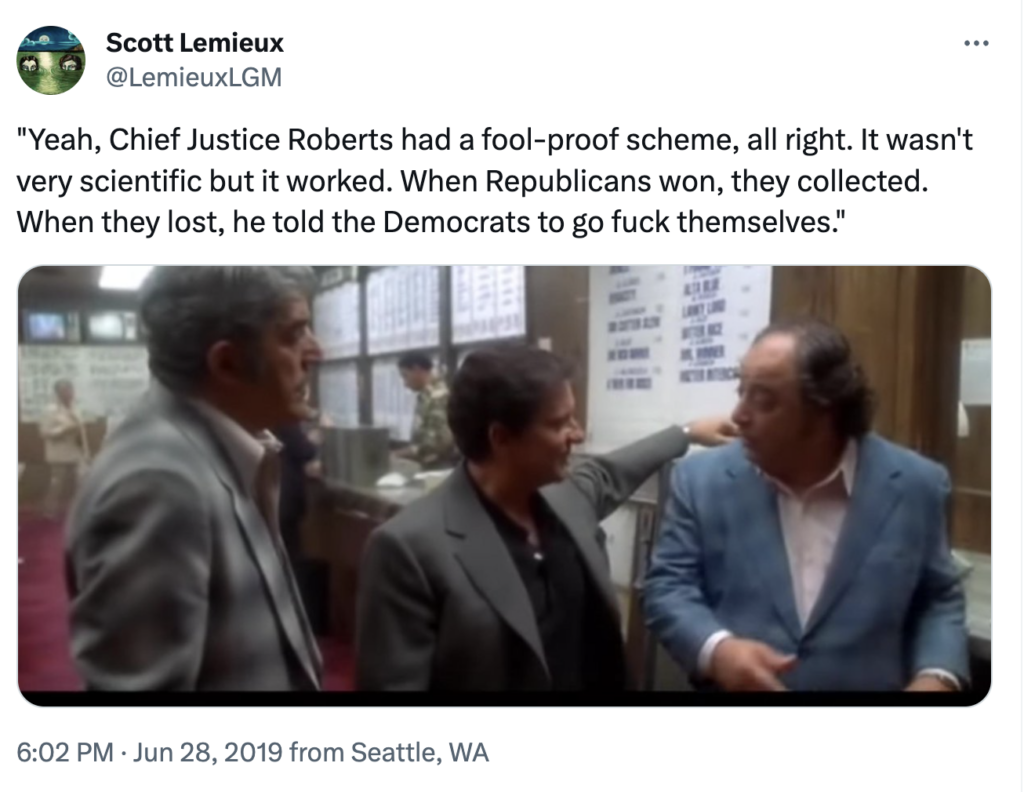
Jamelle Bouie [free link] reflects on the strong signal that the Supreme Court’s Republicans intend to nullify what’s remaining of the most important civil rights legislation passed since Reconstruction:
A federal appeals court sided with the plaintiffs and ordered the Louisiana State Legislature to draw a new map with a second majority-Black congressional district, which it did. But this map was challenged by a group of self-described “non-African American” voters, who charged that it was an illegal racial gerrymander. It’s this case that the Supreme Court has decided in essence to hear again, and it is for this case that the court wants the parties to address “whether the state’s intentional creation of a second majority-minority congressional district violates the 14th or 15th Amendments to the U.S. Constitution.”
Under the current Supreme Court’s vision of a rigidly colorblind Constitution — indifferent to either racial inequality or the mechanisms of color caste — the answer is very likely to be yes. There is also the matter of Chief Justice John Roberts, who has led the court’s effort to curb, limit and undermine the Voting Rights Act. One assumes that having gotten the court to strike down one part of the law in 2013, he is eager to get it to strike down another, given his decades-long hostility to the law, which has been in his sights since he was a young lawyer in the Reagan administration.
We should pause to note another deeply twisted irony here, which is that Roberts — who wrote the outrageous opinion that the Court could do nothing about egregiously unconstitutional and undemocratic gerrymanders because math isn’t real — arbitrarily preserved the ability to strike down exactly one kind of gerrymander, I don’t think that Roberts isn’t a long-term thinker when it comes to destroying the statute that has been his biggest target his entire professional life.
Roberts fulfilling his goal and Donald Trump’s goals are mutually reinforcing:
Americans pride ourselves, by contrast, on our undivided history under one Constitution — a single, ongoing experiment in self-government. But look closely at American history and you’ll see that this is an illusion of continuity that belies a reality of change, and sometimes radical transformation, over time. There are several American republics and at least two Constitutions, a first and a second founding. Our first republic began with ratification in 1788 and collapsed at Fort Sumter in 1861. Our second emerged from the wreckage of the Civil War and was dismantled, as the University of Connecticut historian Manisha Sinha argues, by Jim Crow at home and imperial ambition abroad. If the third American republic took shape under the unusual circumstances of the middle decades of the 20th century — what the Vanderbilt historian Jefferson Cowie calls “the great exception” of depression, war and a political system indelibly shaped by immigration restriction and the near-total exclusion of millions of American citizens from the political system — then the fourth began with the achievements of the civil rights movement, which included a newly open door to the world.
This was an American republic built on multiracial pluralism. A nation of natives and of immigrants from around the world. Of political parties that strove to represent a diverse cross-section of society. Of a Black president and a future “majority-minority” nation. There was an ugly side — it’s no coincidence that state retrenchment from public goods and services followed the crumbling of racial barriers. But for all its harsh notes and discord, this was the closest the country ever came to the “composite nation” of Frederick Douglass’s aspirations: a United States that served as home to all who might seek the shelter of the Declaration of Independence and its “principles of justice, liberty and perfect humanity equality.”
It’s this America that Donald Trump and his movement hope to condemn to the ash heap of history. It’s this America that they’re fighting to destroy with their attacks on immigration, civil rights laws, higher education and the very notion of a pluralistic society of equals.
The Supreme Court’s war on the Voting Rights Act precedes Trump but it is simpatico with his aims. The court’s steady effort to make the law an artifact of the past is of a piece with its broad expansion of executive power for the current president. Both work to undermine the basis for this more politically equal era of American democracy and clear the path to an American autocracy.
But while the Voting Rights Act may be heading to its demise as a functional piece of legislation, it can still stand as a symbol: of our collective capacity to expand the horizons of democratic life; of our creative intelligence in the task of making a more perfect union; and of our ability to confront and overcome the worst of this nation’s past and present.
The Voting Rights Act is quite likely dead. Long live the Voting Rights Act.
This is a dark time, but 2024 was no more the End of History than 1965 was.
The post The Assassination of the Fourth Republic of the United States by the Coward John Roberts appeared first on Lawyers, Guns & Money.






